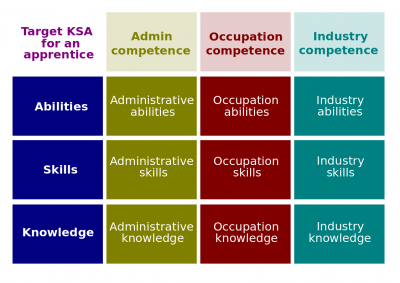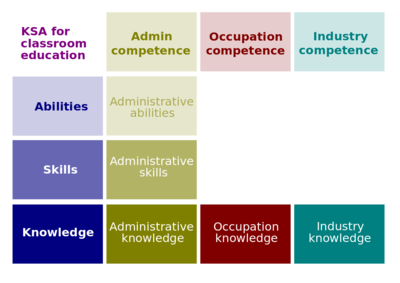Difference between revisions of "Educational Credentials"
(→Quiz) |
(→Script) |
||
| Line 12: | Line 12: | ||
===Script=== | ===Script=== | ||
| − | : | + | :[[Educational credential]]. A [[credential]] that confirms one's [[education]]. Some [[educational institution]]s offer educational programs especially in creative arts and the medical field that combine credentialing of academic achievements and professional experience. |
| + | :[[File:Apprentice-ksa.png|400px|thumb|[[Apprenticeship]]]][[Registered apprenticeship]]. In the [[United States]], [[apprenticeship]] that is registered and overseen by a government organization. In some states, this organization is the [[United States Department of Labor]]; similar state bodies register and oversee [[registered apprenticeship]]s in the other states. Those organizations issue [[educational credential]]s to the graduates from the [[registered apprenticeship]]s. | ||
| + | |||
| + | [[Academic credential]]. An [[educational credential]] that is issued by an [[educational institution]] or [[credentialing organization]] to certify specific academic achievements traditionally related to someone's knowledge. | ||
| + | :[[High school diploma]]. An [[academic credential]] that certifies that someone has been graduated from a high school. | ||
| + | :[[GED]] ([[General Equivalency Diploma]]). A credential that certifies that someone has successfully passed the test that covers United States or Canadian high school-level academic skills. | ||
| + | :[[Diploma]]. A certificate or deed issued by an educational institution, such as college or university, that testifies that the recipient has completed a particular course of study. | ||
| + | :[[Associate degree]] (or [[associate's degree]]). An undergraduate academic degree awarded by colleges and universities upon completion of a course of study intended to usually last two years or more. | ||
| + | :[[Bachelor's degree]]. An undergraduate academic degree awarded by colleges and universities upon completion of a course of study lasting three to seven years depending on institution and academic discipline. | ||
| + | :[[File:Masters-degree-ksa.png|400px|thumb|[[Master's degree]]]][[Master's degree]]. A graduate academic degree awarded by colleges and universities upon completion of a course of study lasting one to three years beyond the coursework required by a [[Bachelor's degree]]. | ||
| + | :[[PhD]] ([[Doctor of Philosophy]], also known as [[PhD degree]] or [[Ph.D.]]). The highest, terminal academic degree awarded by universities in most countries. The requirements to earn a [[PhD]] regularly include comprehensive examinations and work on thesis or dissertation based on extensive research. | ||
| + | :[[Professional degree]]. A degree that prepares someone to work in a particular profession, often meeting the academic requirements for licensure or accreditation. | ||
| + | :[[Credentialism]] ([[academic inflation]]). The process of the devaluation of educational qualifications because of the needs of [[educational institution]]s to increase revenues and cut expenses, on one side, and increasing demands, on the other side. This process further provokes [[credential creep]]. | ||
'''[[Academic Credentials]]''' is the successor [[lectio]]. | '''[[Academic Credentials]]''' is the successor [[lectio]]. | ||
Revision as of 20:17, 7 May 2020
Confirmations of Education (hereinafter, the Lectio) is the second lesson part of the Educational Credentials lesson that introduces its participants to educational credentials and related topics.
This lesson belongs to the Introduction to Education session of the CNM Cyber Orientation. The Orientation is the second stage of the WorldOpp Pipeline.
Contents
Content
The predecessor lectio is Learning Arrangements.
Key terms
- Educational credential. A credential that confirms one's education. Some educational institutions offer educational programs especially in creative arts and the medical field that combine credentialing of academic achievements and professional experience.
- Registered apprenticeship. In the United States, apprenticeship that is registered and overseen by a government organization. In some states, this organization is the United States Department of Labor; similar state bodies register and oversee registered apprenticeships in the other states. Those organizations issue educational credentials to the graduates from the registered apprenticeships.
Script
- Educational credential. A credential that confirms one's education. Some educational institutions offer educational programs especially in creative arts and the medical field that combine credentialing of academic achievements and professional experience.
- Registered apprenticeship. In the United States, apprenticeship that is registered and overseen by a government organization. In some states, this organization is the United States Department of Labor; similar state bodies register and oversee registered apprenticeships in the other states. Those organizations issue educational credentials to the graduates from the registered apprenticeships.
Academic credential. An educational credential that is issued by an educational institution or credentialing organization to certify specific academic achievements traditionally related to someone's knowledge.
- High school diploma. An academic credential that certifies that someone has been graduated from a high school.
- GED (General Equivalency Diploma). A credential that certifies that someone has successfully passed the test that covers United States or Canadian high school-level academic skills.
- Diploma. A certificate or deed issued by an educational institution, such as college or university, that testifies that the recipient has completed a particular course of study.
- Associate degree (or associate's degree). An undergraduate academic degree awarded by colleges and universities upon completion of a course of study intended to usually last two years or more.
- Bachelor's degree. An undergraduate academic degree awarded by colleges and universities upon completion of a course of study lasting three to seven years depending on institution and academic discipline.
- Master's degree. A graduate academic degree awarded by colleges and universities upon completion of a course of study lasting one to three years beyond the coursework required by a Bachelor's degree.
- PhD (Doctor of Philosophy, also known as PhD degree or Ph.D.). The highest, terminal academic degree awarded by universities in most countries. The requirements to earn a PhD regularly include comprehensive examinations and work on thesis or dissertation based on extensive research.
- Professional degree. A degree that prepares someone to work in a particular profession, often meeting the academic requirements for licensure or accreditation.
- Credentialism (academic inflation). The process of the devaluation of educational qualifications because of the needs of educational institutions to increase revenues and cut expenses, on one side, and increasing demands, on the other side. This process further provokes credential creep.
Academic Credentials is the successor lectio.
Quiz
- Every statement below is split into one true and one false question in the actual exam.
- A high school diploma and professional degree are (not) examples of academic credential.
- All academic credentials are (not) educational ones.
- All educational credentials are (not) academic ones.
- One can (not) land a good job without a high-school diploma.
- One can (not) land a good job without an academic credential.
- Graduating from university rather from an apprenticeship leads (does not necessarily lead) to a better job.
- With regard to fast employment, schools and universities do (not) tend to be better than apprenticeship.
- Graduating from apprenticeship rather from an university leads (does not necessarily lead) to a better job.
- With regard to fast employment, apprenticeship does (not) tend to be better than schools and universities.


